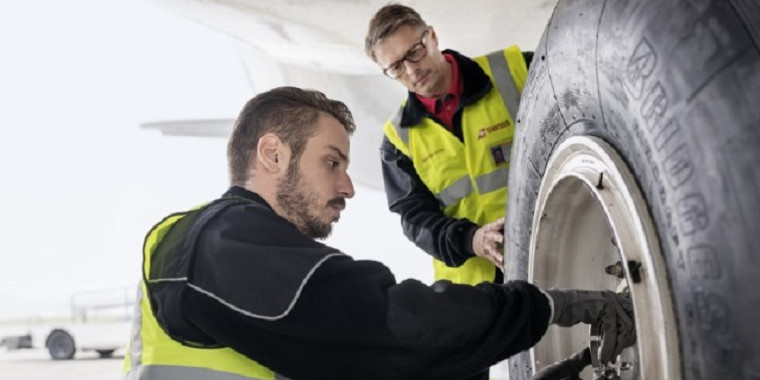Sep 29, 2016 Silke Kley
ShareWhen you think of aircraft maintenance, what is the first image that comes to mind? Do you picture an aircraft standing in a big hangar being surrounded by a number of staff, equipment, tools and parts? If so, your answer might be consistent with the vast majority. But did you ever ask yourself what else lies behind the concept?
In general, aircraft maintenance can be divided into line and base maintenance. Whereas base maintenance includes activities which require the aircraft to be taken out of service for longer periods and which require special equipment only available in a hangar, line maintenance activities are mostly carried out during normal turnaround periods where the aircraft is on the ground. During line maintenance, the aircraft is not always taken out of service and the maintenance activities can be done at the gate or stand itself (or in a hangar if time permits). Unlike base maintenance, which is always scheduled for longer ground times, line maintenance cannot always be scheduled, since it can imply dealing with unplanned issues arising during normal flight operations. Being well prepared for unplanned maintenance is fundamental to getting an aircraft back into service quickly after experiencing a technical issue, avoiding delays and cancellations. However, as many maintenance departments still communicate via radio or conventional telephones, technical information necessary to perform an unplanned task isn’t always easily available, causing engineers to take longer to complete their job. In order to understand the situation better, let’s have a look at the current workflow in more detail.
All information necessary to perform a maintenance task is to be found in the maintenance information system. At the beginning of each shift, the lead engineer reviews all maintenance tasks for the day and assigns them to his or her team members. Equipped with their job assignments and all pertinent documentation the engineers are sent off to their first aircraft, working on routine and special checks. While out on the apron, everything goes according to plan. Nevertheless, unplanned maintenance is never far behind. When informed about a non-routine maintenance task, the lead engineer needs to act fast and assign the task efficiently. This means taking into consideration the various skills of all team members, their location on the apron and the status of their current job assignment. However, without any real-time information, things can get difficult. If the lead engineer wants to find out who is located near the aircraft requiring special assistance, he has no other choice but to call each team member individually to check their position and availability. Although some engineers might be near the aircraft, they might already be working on a task that cannot be deferred. As a result, such inefficient information flows slow down the reaction time, delaying the response to a technical issue. In a mission-critical industry, where every minute counts, consequences can be severe.
THE GOOD NEWS: IT CAN BE DONE DIFFERENTLY!
Line maintenance is at its best when sharing information in real time. This is why airlines such as SWISS are in the process of implementing a maintenance-geared mobility solution. Line engineers are being equipped with smartphones on which modern applications allow them to see task assignments, task information, enter their job status, report defects and interact with their maintenance department in real time and at any time during the day. Unplanned maintenance can now be addressed quickly by the nearest engineer available having the correct qualification. The app even allows them to access the information they need in order to perform the turnaround faster. At the same time, it reduces the need for time consuming voice communication prone to misunderstandings. An additional advantage is the reduction of paperwork for engineers. Thanks to these efficiency gains, airlines can greatly reduce maintenance-related flight delays and cancellations, reducing costs and increasing overall passenger satisfaction.
About our Expert
Silke Kley
Silke joined INFORM in 2015 as Marketing Manager and worked in our Aviation Division.

